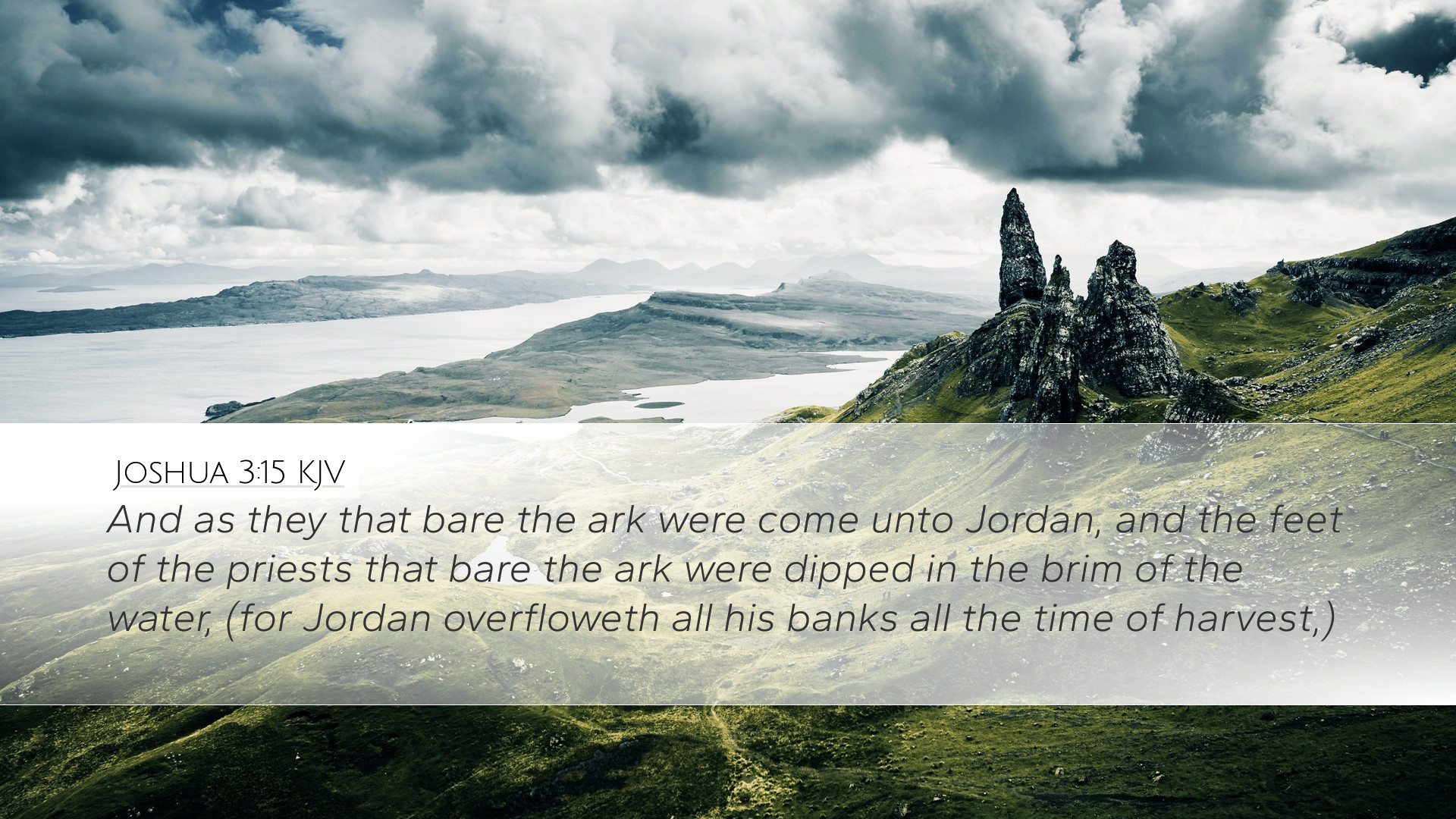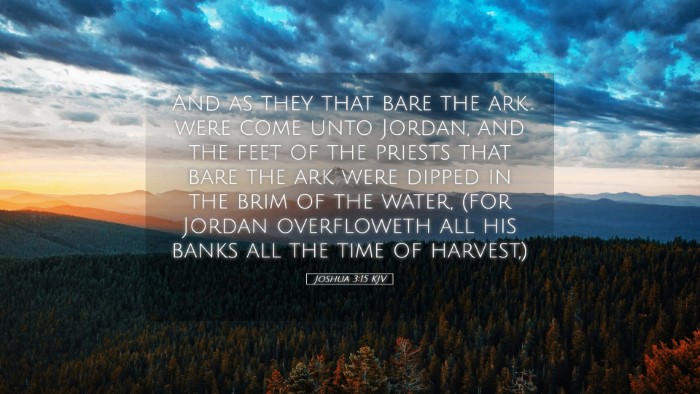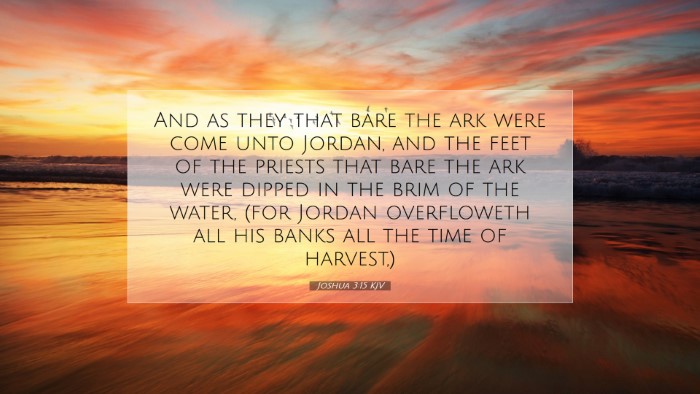Old Testament
Genesis Exodus Leviticus Numbers Deuteronomy Joshua Judges Ruth 1 Samuel 2 Samuel 1 Kings 2 Kings 1 Chronicles 2 Chronicles Ezra Nehemiah Esther Job Psalms Proverbs Ecclesiastes Song of Solomon Isaiah Jeremiah Lamentations Ezekiel Daniel Hosea Joel Amos Obadiah Jonah Micah Nahum Habakkuk Zephaniah Haggai Zechariah MalachiJoshua 3:15
Joshua 3:15 KJV
And as they that bare the ark were come unto Jordan, and the feet of the priests that bare the ark were dipped in the brim of the water, (for Jordan overfloweth all his banks all the time of harvest,)
Joshua 3:15 Bible Commentary
Commentary on Joshua 3:15
Text of Joshua 3:15: "And when those that bare the ark were come unto Jordan, and the feet of the priests that bare the ark were dipped in the brim of the water, (for Jordan overfloweth all his banks all the time of harvest,)"
Introduction
Joshua 3:15 presents a pivotal moment in Israel's history as they prepare to cross the Jordan River into the Promised Land. This verse encapsulates both the challenge and the miracle involved in their journey, displaying God’s providence and the faith of the people. Various commentators provide insights into the theological and practical implications of this event.
The Context of Crossing the Jordan
Prior to this moment, the Israelites had wandered in the wilderness for 40 years. The Jordan River at this time was overflowing, making the crossing particularly daunting. This detail sets the stage for a miraculous intervention by God.
Historical Significance
- Matthew Henry: That the Jordan was at its flood stage highlights God’s power. Human impossibilities often serve as backdrops for divine miracles.
- Albert Barnes: The timing of this event, during the harvest when the river is swollen, emphasizes that faith often calls us to confront formidable barriers.
- Adam Clarke: The Jordan symbolizes obstacles in life, and God providing a way through illustrates His continual support for His people.
The Role of the Ark of the Covenant
The Ark of the Covenant, which the priests bear, signifies God's presence among His people. Its role is crucial for understanding the dynamics of faith and obedience in this narrative.
Significance of the Ark
- Matthew Henry: The ark is a token of God's covenant and indicates His leading. The crossing is tied to His promise to Israel.
- Albert Barnes: The priests, as they carry the ark, act as mediators between God and the people, demonstrating obedience as they step into the rushing waters.
- Adam Clarke: The priests’ faith is commendable; they stepped into the overflowing river before God performed the miracle, showing us that faith often necessitates action.
Lessons on Faith and Obedience
This verse emphasizes the relationship between faith, obedience, and divine intervention. The act of dipping their feet into the water embodies an obedient response to God’s command.
The Nature of Faith
- Matthew Henry: Faith is not passive; it anticipates God's action. The priests' willingness to step into the water reflects trust in God despite circumstances.
- Albert Barnes: The requirement to move forward before the water parted illustrates that faith often proceeds without visible assurance of success.
- Adam Clarke: The action of the priests shows that God's barriers do not deter the faithful; rather, they invite them to trust more deeply in His promises.
Theological Reflections
This passage invites deep theological reflection on the nature of God’s faithfulness, the significance of human participation in divine plans, and the implications of trusting God in seemingly insurmountable situations.
God's Faithfulness
- Matthew Henry: The crossing of the Jordan exemplifies God's faithfulness; just as He led them out of Egypt, He leads them into the Promised Land.
- Albert Barnes: It highlights God's sovereignty; the natural flood becomes an avenue for divine deliverance.
- Adam Clarke: The continuity of God's involvement in history is significant, reminding believers that He remains active in their lives today.
Practical Applications
For pastors, students, and theologians, Joshua 3:15 extends beyond mere narrative; it is a call to action and reflection about faith—how it is exercised in challenging times and its role in God’s greater narrative.
Encouragement in Challenges
- Matthew Henry: Believers are reminded to act with faith even when the outcome seems uncertain.
- Albert Barnes: This passage serves as an assurance that God will provide a path through trials when we respond in obedience.
- Adam Clarke: Every believer is encouraged to assess their own 'Jordan'—those barriers that stand in the way of God’s promise—and to step forward with faith.
Conclusion
Joshua 3:15 is not only a historical account but a profound narrative about faith, obedience, and the miraculous nature of God. It serves as an essential reminder for all readers that while challenges may be daunting, faithfulness to God's word can lead to divine breakthroughs. The reflections of Matthew Henry, Albert Barnes, and Adam Clarke collectively urge believers to embrace the journey of faith, trusting in God’s unfailing presence and power.


